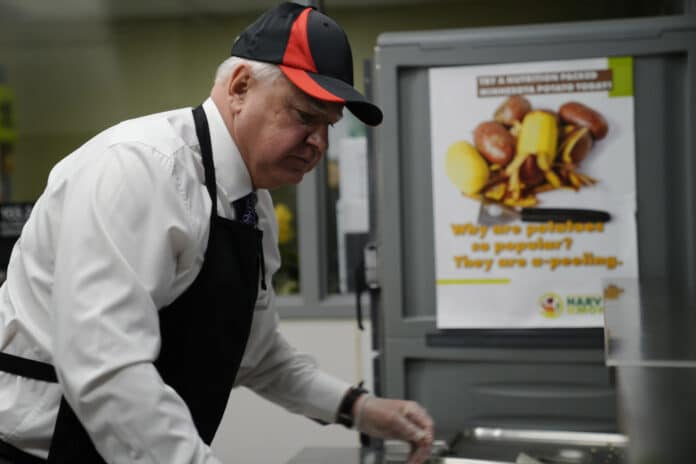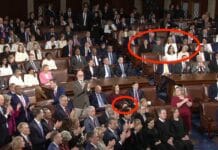
Just one month after state budget officials revealed a new universal school meals program would cost $176 million more over the next two years than DFL sponsors estimated when it passed in the legislature last spring, Gov. Tim Walz is touting its success, saying the program is “an investment I’ll defend every damn day.”
On Wednesday, while the governor prepared to serve up a handful of free, hot lunches for students at Edgerton Elementary in Maplewood, he took to social media.
“The data is in: Over 1 million more school lunches were served monthly last fall,” Walz said in a post to X (formerly known as Twitter). “That’s nearly 16 million total meals served every month, saving families thousands and making parents’ lives easier.”
Walz was referring to data from the Minnesota Department of Education that show that 1.1 million more lunches were served to students across the state in the first month of the school year than the same time span in 2022. MDE also says that 1.2 million more breakfasts were served in the first month of the 2023-24 school year than during the same span one year prior.
At first glance, those numbers appear to be a significant increase. But a breakdown of enrollment data across more than 870,000 students enrolled in K-12 in more than 2,000 schools statewide shows that each school building in Minnesota is actually serving up — on average — between 25 and 27 more lunches every day than it did last school year.
Prior to implementation of the new universal school meals program this fall, more than 274,000 students at Minnesota’s public, charter and private schools were receiving free or reduced school meals. That equated to about 30 percent of all students.
One year ago, as the bill advanced in the legislature, several Republican lawmakers argued that a universal meals program that’s not means tested based on household income would be unsustainable in the long-term, especially when school lunches on average cost students just $3 a day.
But Walz on Wednesday defended the program amid those newly revealed cost overruns.
“Free school breakfast and lunch is an investment I’ll defend every damn day,” Walz posted to social media just a few moments before he joined Department of Education Commissioner Willie Jett and Lt. Gov. Peggy Flanagan in working the hot lunch line for students at Edgerton, one of Roseville Area Schools’ seven elementaries.
Flanagan also chimed in on social media while she was on site for the public relations event touting the program.
“Y’all, we did it! This school year, over 1 million more school lunches have been served monthly,” Flanagan tweeted. “That’s *a lot* more kids with full bellies ready to succeed in and out of the classroom.”
New budget forecast says rising cost of program tied to higher demand than estimated
When the DFL-controlled House of Representatives passed the bill in February, its language called for the Minnesota Department of Education to spend $191.6 million on the new free school meals program in fiscal year 2024 and $198.6 million in fiscal year 2025. The program also was budgeted to spend $25.2 million in fiscal year 2024 and $25.8 million in fiscal year 2025 for free school breakfasts.
But late last year, just months into the new program, state officials revealed in their November budget forecast that the school meals program would cost $81 million more over the next two years and $95 million in following biennium.
The report from the Minnesota Office of Management and Budget says that “state aid amounts for the new program are now linked to U.S. Department of Agriculture (USDA) reimbursement rates for school nutrition programs, which are greater than previously estimated in all years of the forecast period.”
“Additionally, early data from this school year indicate that participation in the program is above the estimates assumed at the time” the legislation was passed, the report says.
A spokesperson for Walz Wednesday said the fact that more than 15 million lunches are served to students every month at no charge will save families thousands of dollars per year.
While the legislation was passed during a historic $17.5 billion state budget surplus, Republican leaders in the House and Senate have criticized the ability for the state to pay for the program in perpetuity, without additional tax increases.
In the House the legislation passed in February on party lines, with all 70 DFLers voting for the universal school meals program. In the Senate, four Republicans joined 34 Democrats in voting for the bill. Those green votes included: Jim Abeler of Anoka, Julia Coleman of Waconia, Karin Housley of Stillwater and Zach Duckworth of Lakeville. The House then took up the Senate version and adopted it with the support of 70 Democrats and one Republican, Elliot Engen of White Bear Township.
Minnesota is one of three states to implement universal school meals for its K-12 students in perpetuity, following expiration in 2022 of a federal, pandemic-era program that provided free school meals for all. California and Maine are the others.
Hank Long
Hank Long is a journalism and communications professional whose writing career includes coverage of the Minnesota legislature, city and county governments and the commercial real estate industry. Hank received his undergraduate degree at the University of Minnesota, where he studied journalism, and his law degree at the University of St. Thomas. The Minnesota native lives in the Twin Cities with his wife and four children. His dream is to be around when the Vikings win the Super Bowl.










